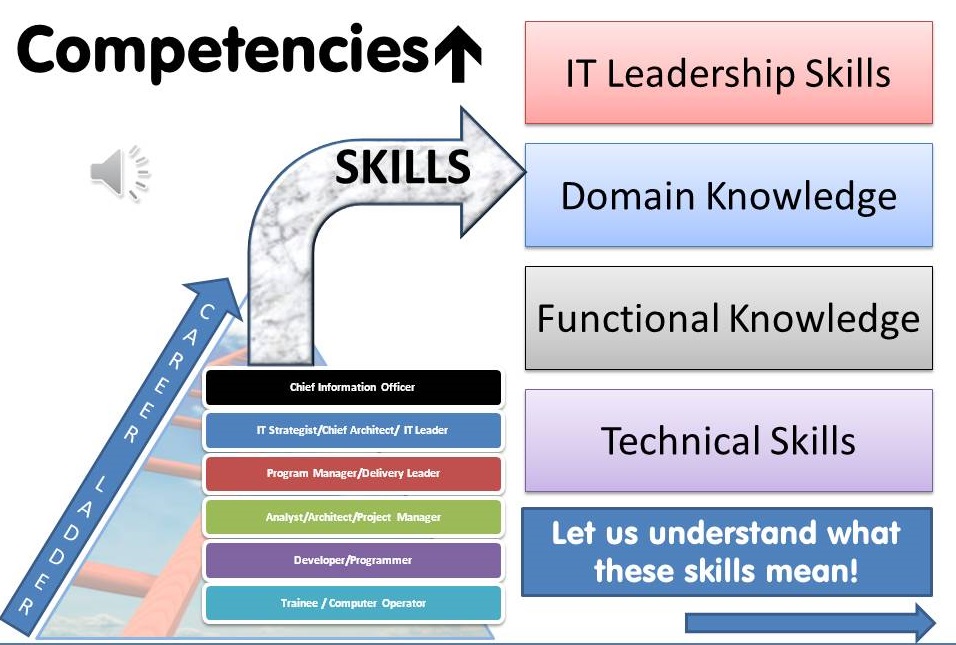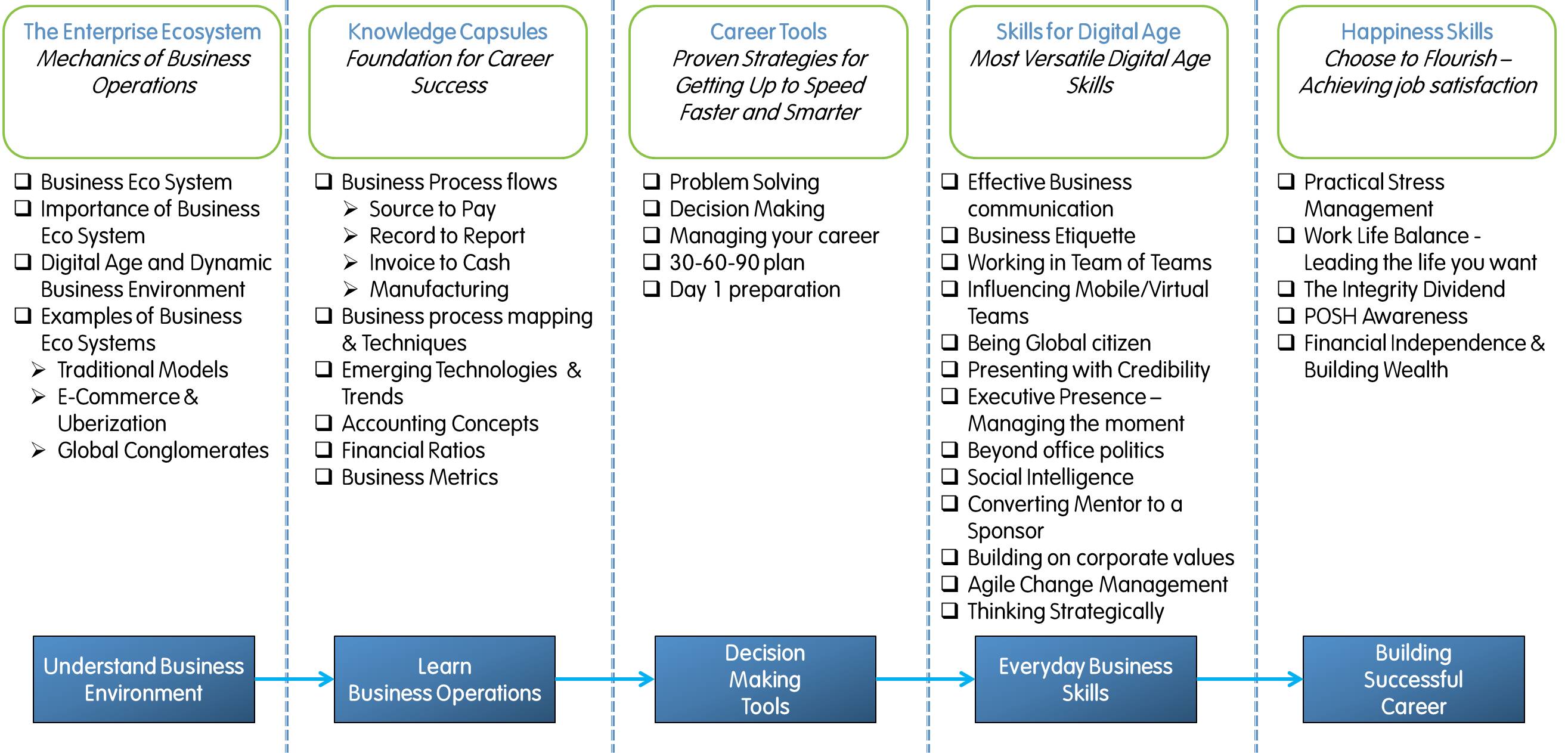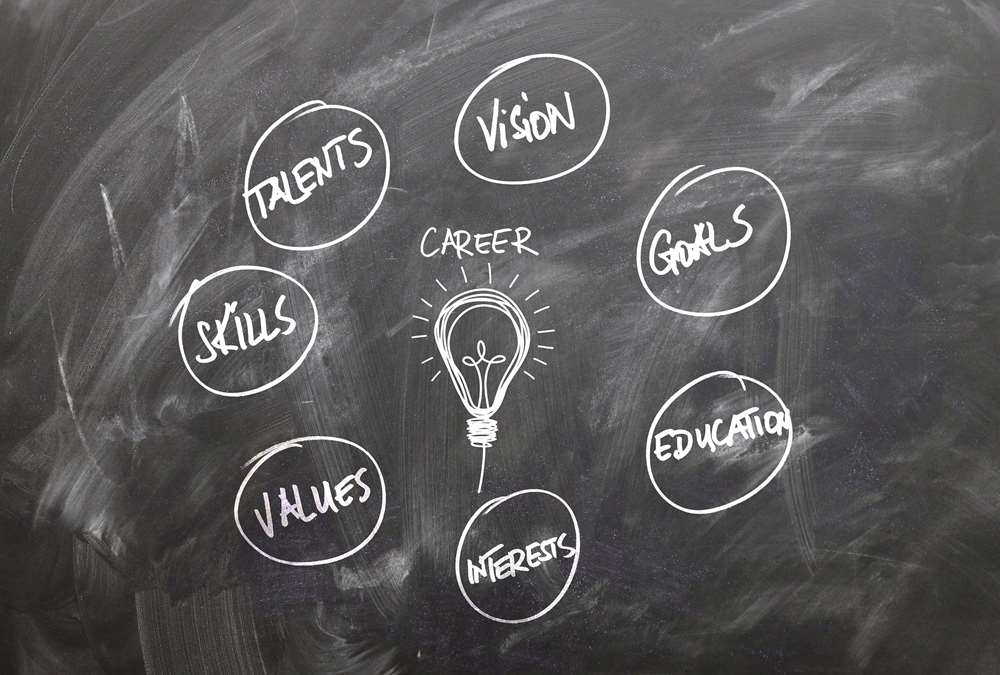- Home
- Business Processes
- Industry Knowledge
- Aerospace Industry
- Automotive Industry
- Banking Domain
- BFSI Industry
- Consumer/ FMCG Industry
- Chemicals Industry
- Engineering & Construction
- Energy Industry
- Education Domain
- Finance Domain
- Hospitality Domain
- Healthcare Industry
- Insurance Domain
- Retail Industry
- Travel and Tourism Domain
- Telecom Industry
- Leadership Skills
- eLearning
- Home
- Leadership Skills
- Career Management
- Improving Skills & Competencies
Improving Skills & Competencies
Whenever you are looking for a job or having your yearend discussion with your manager, two terms generally referred to be “Skills” and “competencies”. Today success in a career is an outcome of having essential competencies and building required skills. Skills could be a major distinguishing factor for you to move up on the career ladder and jump from one role to another. Leadership skills when combined with relevant domain and functional expertise can transform your entire career growth and help you have a fulfilling career.
We generally use these words interchangeably but there is a subtle difference between these two terms. If you’re looking for resources for your career planning or career management or a new job, it is important to understand the differences between the two.
Meaning of Skills
Skills are the specific abilities required to perform a specific job well. Examples could be accounting skills, coding skills, and writing skills, etc. Hard Skills require professional or technical study and soft skills are non-technical in nature and generic skills like communication skills or negotiation skills.
Meaning of Competencies
Competencies are cumulative knowledge and behaviors that lead a professional to work effectively and be successful in a job. Some examples of competencies are process engineering, strategic planning, etc.
Type of Skills
It is also important to understand that at each stage of your career, different skills and competencies will be important for ensuring your success. At the start of your career, for instance, it is technical skills and expertise that you should focus on building. As your career progresses, you are likely to move away from certain day-to-day tasks, and instead towards projects in other areas of the business. These later stages of your career are where such competencies as the ability to influence, negotiate and strategies will need to be developed. Let us explore different types of skills and also try to understand what employers demands as you grow higher and higher in the chain.
1. Technical Skills.
We start our career by learning any emerging or established technical skills. Tough business problems require technical expertise and analytical thinking and technical experts and professionals are expected to keep pace to changing technologies.
Technical skills are the abilities and knowledge needed to perform specific tasks. Technical skills also refer to the expertise of a certain type of market participant who uses technical analysis signals to buy and sell stocks, bonds, futures, and other financial instruments. They are practical and often relate to mechanical, information technology, mathematical, or scientific tasks. Typical technical skills are programming, the analysis of complex figures, or the use of specific tools.
Learn more about Technical Skills
2. Functional Skills
Functional Consultants are the experts having knowledge of concepts and business processes; with an understanding of business flows; with the added capability to analyze underlying software functionalities in comparison to business expectations. Here you bridge the gap between business and technology.
Functional Expertise is knowledge of business processes and related concepts that explains the nature, causes, and effects of individual and integrated business activities. Functional Knowledge is the practical, tangible, and usable knowledge of a particular business function enabling the possessor capable of performing that activity. Functional skills can be adapted from one business area to another and these skills are generally transferable across multiple business domains.
Learn more about Functional Skills

3. Domain Knowledge & Skills
Domain knowledge is knowledge about the environment in which the business systems operate, and it encompasses the understanding of the industry dynamics and business processes of the target enterprise. IT professionals provide IT solutions to various industries that need to be tailored to the unique demands of each industry and its dynamics. For these solutions to be sustainable and effective they must be designed keeping in view the present and future dynamics of the industry and that can be achieved only by having domain expertise of the industry.
Domain knowledge is knowledge about the environment in which any organizational system operates. From a career management perspective, it encompasses the understanding of industry dynamics and business processes of the target operational area. For the software developer and tester, domain Knowledge is the knowledge of the environment affecting IT systems decisions and implementation environments. For a person interested in becoming a domain expert, it is the knowledge of a specific, specialized discipline or field like banking or travel industry which use different terminologies, have different processes and metrics and operational mechanisms. People who have domain knowledge, are often considered specialists or experts in the field.
Learn more about Domain Knowledge
4. Leadership Skills
It compasses general leadership skills, project management, Process leadership, Change leadership, and Enterprise and strategic thinking. Unfortunately, many leaders don’t have access to various tools and skills that can help them navigate through the complexities of today’s dynamic business environment. Leadership skills embrace comprehensive management and leadership, team management, decision-making, project management, personal productivity, creativity, problem-solving, and communication skills helpful in addressing career problems, and guide you on how to advance your career in a positive and seemingly effortless way.
Leadership skills can help you become exceptionally effective, be a great manager and leader, and most importantly be more successful in your career. Leadership skills when combined with relevant domain and functional expertise can transform your entire career growth and help you have a fulfilling career. Leadership skills are necessary for the further growth of organizational leaders at all levels. Browse specific tutorials by clicking on the leadership area of your interest. Click here to see the tutorials available under leadership skills.
- Leadership Styles - Learn more than 60 Leadership Styles
- Leadership Theories - Learn 30+ Leadership Theories and their practical applications
- Career Management - Get the Career You Want
- Change Leadership - Effectively Handle Change
- Communication Skills - Listen, Talk and Reflect
- Creativity Tools - Let Your Creative Juices Flow
- Decision Making - Lead Your Way
- Management Concepts - Build a Strong Management Foundation
- Problem Solving - Sustainable Solutions to Problems
- Project Leadership - Project & Program Management
- Strategy Tools - Strategic Thought Leadership
- Stress Management - Bring More Happiness
- Team Leadership - Build Effective Teams
- Time Management – Manage your time effectively
List of Key Competencies
A competency list is frequently used by organizations to ascertain the competencies staff needs to have. Given below is the list of key career competencies:
- Customer Focus & Orientation
- Analysis/Problem Solving / Decision Making
- Quick Thinking/Learning
- Team Work and Leadership
- Communication and Negotiation
- Self Confidence/Resilience / Emotional Quotient
- Judgment/Decision Making
- Researching And Investigating
- Planning And Organizing
- Results/Quality Orientation
- Interpersonal Effectiveness
- Personal Motivation
- Flexibility/Adaptability
- Initiative/Independence

If you want to be successful, don't seek success - seek competence, empowerment; do nothing short of the best that you can do.
- Jaggi Vasudev
Related Links
Explore Our Free Training Articles or
Sign Up to Start With Our eLearning Courses

About Us
Learning
© 2023 TechnoFunc, All Rights Reserved
